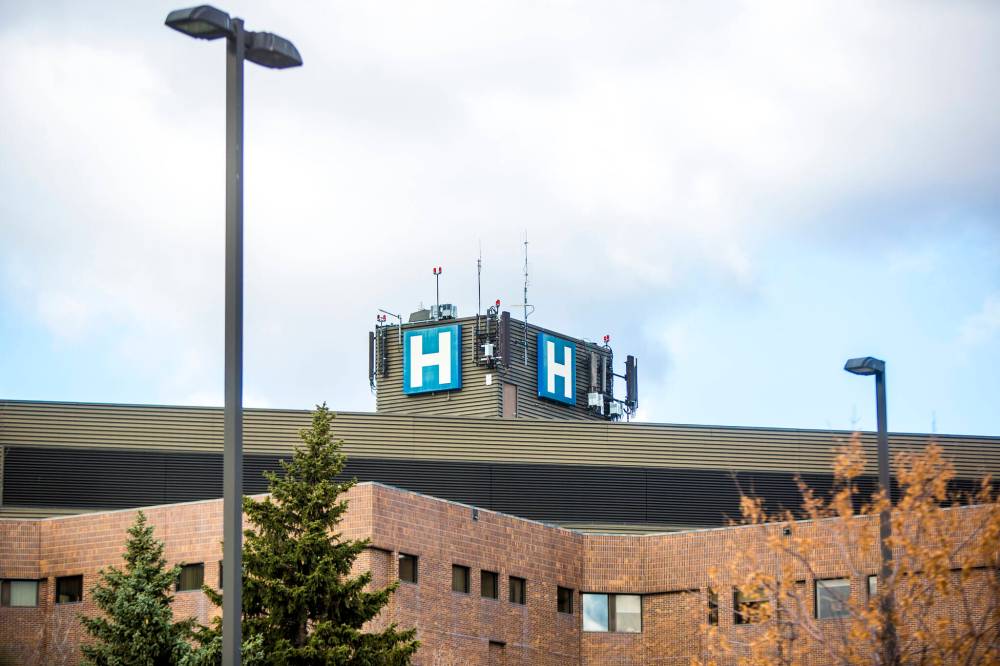Budget’s health-care cash must be targeted to combat wait times
Advertisement
Read this article for free:
or
Already have an account? Log in here »
To continue reading, please subscribe:
Monthly Digital Subscription
$0 for the first 4 weeks*
- Enjoy unlimited reading on winnipegfreepress.com
- Read the E-Edition, our digital replica newspaper
- Access News Break, our award-winning app
- Play interactive puzzles
*No charge for 4 weeks then price increases to the regular rate of $19.95 plus GST every four weeks. Offer available to new and qualified returning subscribers only. Cancel any time.
Monthly Digital Subscription
$4.99/week*
- Enjoy unlimited reading on winnipegfreepress.com
- Read the E-Edition, our digital replica newspaper
- Access News Break, our award-winning app
- Play interactive puzzles
*Billed as $19.95 plus GST every four weeks. Cancel any time.
To continue reading, please subscribe:
Add Free Press access to your Brandon Sun subscription for only an additional
$1 for the first 4 weeks*
*Your next subscription payment will increase by $1.00 and you will be charged $16.99 plus GST for four weeks. After four weeks, your payment will increase to $23.99 plus GST every four weeks.
Read unlimited articles for free today:
or
Already have an account? Log in here »
Hey there, time traveller!
This article was published 21/03/2025 (294 days ago), so information in it may no longer be current.
The NDP government plans to increase spending on health care this year by a record $1.2 billion, a 14 per cent increase over last year’s budget.
It’s the largest boost in health-care spending in a single year, at least in Manitoba’s recent history.
Will it make a difference in a health-care system still plagued with long wait lists and crowded emergency departments? Probably, but don’t expect miracles, or even immediate results.

MIKAELA MACKENZIE / FREE PRESS FILES
More funding hasn’t translated into lower wait times for most surgeries, nor has it had a measurable impact on congested emergency departments, writes Brodbeck.
Health care in Manitoba has been underfunded for several years, particularly under the previous Progressive Conservative government. In 2019, during the second phase of hospital consolidation operations in Winnipeg (including converting three ERs to urgent care centres), the Tories increased health care spending by only 1.5 per cent, to $6.663 billion in 2019-20 from $6.564 billion in 2018-19 (actual spending, not the budgeted amount). That’s a cut, adjusted for inflation and population growth.
Regional health authority budgets were reduced and front-line staffing was slashed. That contributed to longer wait times for surgical procedures and resulted in emergency room overcrowding.
Health-care spending has been on the upswing since 2023, the Tories’ last year in office. Actual spending in health care in 2023-24 (not the budgeted amount) increased a staggering 13.4 per cent compared to the previous year, according to the province’s public accounts.
That included financing new collective agreements for front-line workers and costs related to recruitment and retention efforts, under both the outgoing Tory government (which lost the October 2023 election) and the new NDP one.
Has that money helped? A little. Government has added 1,255 net new front-line staff to the health-care system and 233 fully staffed beds across Manitoba since the NDP won government. According to Thursday’s budget, the amount of mandatory overtime for nurses working in Winnipeg fell 45 per cent between October 2023 and October 2024, “evidence that increased staffing levels are making an impact on the front lines.”
Trouble is, that hasn’t translated into lower wait times for most surgeries, nor has it had a measurable impact on congested emergency departments.
The median wait time for ERs and urgent care centres in Winnipeg was 3.43 hours in January (the point at which half of patients had shorter wait times and half had longer ones). That’s a tiny bit better than the 3.67 hours in January 2024. It’s still about double what it was prior to the COVID-19 pandemic.
Wait times for most surgical procedures reported by the province are largely unchanged from where they were prior to the pandemic. And wait times for most diagnostic testing — including MRIs, CT scans and ultrasounds — were longer in 2024 than in 2023 and far higher than they were prior to the pandemic, according to provincial data.
Of the $1.2 billion in new money going into health care this year, $770 million will be spent on front-line staff. That includes $47 million in funding for 97 new staffed beds, including 60 acute care hospital beds, 10 new critical care beds and 27 new transitional beds for long-term patients waiting for placement outside of hospitals.
Those beds will help, but are they enough? Probably not.
What’s missing from the equation are wait time targets and a detailed analysis of how much more capacity in the system is required to hit those benchmarks (as well as what it would cost).
Without that kind of detailed planning, dollar amounts and projected staffing levels are arbitrary and somewhat meaningless.
Simply throwing more money at the system is not the answer. It’s great that the health-care system is getting the kind of cash infusion presented in the budget and that more front-line staff are being hired. But that alone won’t significantly bring down wait times.
Granted, it takes time to do so — years not months. But hospitals also need to be better managed, including different funding models that reflect patient volumes (as opposed to block funding) and more modern systems that speed up patient flow through hospitals.
The average length of stay for patients in Winnipeg hospitals continues to climb every year. It’s up to 10.18 days in 2023-24 from 9.11 days in 2019-20. That contributes to hospital congestion, gobbles up scarce staffing resources and causes bottlenecks in emergency departments, where admitted patients often wait days for a bed on a medical ward.
Those are management issues that need to be addressed. It’s not just about money.
Adding $1.2 billion to Manitoba’s health-care system is a good thing, but how that money gets spent will be even more important.
tom.brodbeck@freepress.mb.ca

Tom Brodbeck is an award-winning author and columnist with over 30 years experience in print media. He joined the Free Press in 2019. Born and raised in Montreal, Tom graduated from the University of Manitoba in 1993 with a Bachelor of Arts degree in economics and commerce. Read more about Tom.
Tom provides commentary and analysis on political and related issues at the municipal, provincial and federal level. His columns are built on research and coverage of local events. The Free Press’s editing team reviews Tom’s columns before they are posted online or published in print – part of the Free Press’s tradition, since 1872, of producing reliable independent journalism. Read more about Free Press’s history and mandate, and learn how our newsroom operates.
Our newsroom depends on a growing audience of readers to power our journalism. If you are not a paid reader, please consider becoming a subscriber.
Our newsroom depends on its audience of readers to power our journalism. Thank you for your support.







